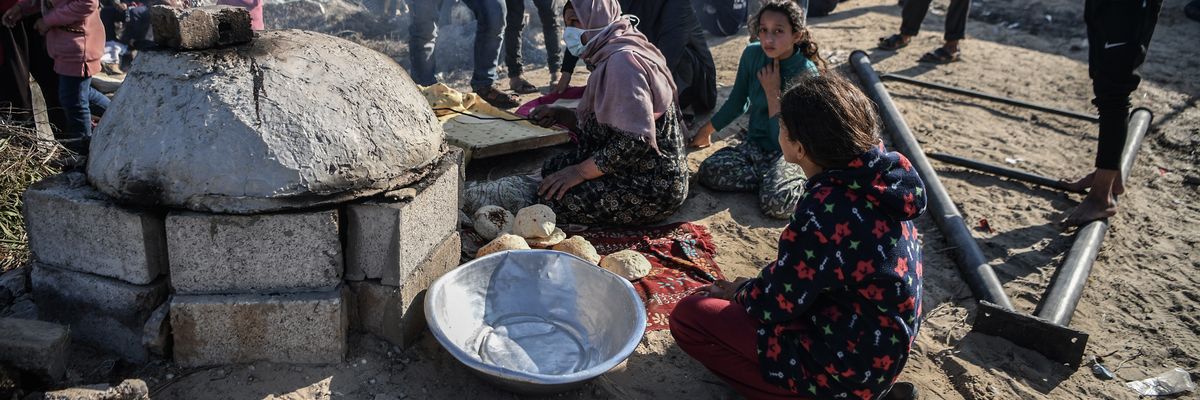As the United Nations warned Monday that at least a quarter of civilians in Gaza are suffering from "catastrophic" food insecurity and the collapse of the healthcare system is causing disease to spread, the U.S. Senate doubled down on cutting funding for the U.N.'s top humanitarian agency serving Palestinians by including in a bipartisan package a provision that would block aid for the body.
The proposed $118 billion Emergency National Security Supplemental Appropriations Act, chiefly negotiated by Sens. Chris Murphy (D-Conn.), Kyrsten Sinema (I-Ariz.), and James Lankford (R-Okla.) includes $14.1 billion for Israel, which has killed at least 27,468 Palestinians in Gaza and at least 360 in the West Bank since beginning its assault on the occupied territories in October.
But a provision notes that none of the $10 billion in humanitarian assistance for Palestinians and Ukrainians "may be made available for a contribution, grant, or other payment" to the United Nations Relief and Works Agency for Palestine Refugees in the Near East (UNRWA).
Just after the International Court of Justice (ICJ) said in an interim ruling late last month that South Africa's claim that Israel is committing a genocide in Gaza is "plausible," Israel announced it had discovered that 12 of the agency's 13,000 employees in Palestine had been involved in the Hamas-led attack on southern Israel on October 7.
Israeli officials did not provide evidence confirming their allegations, but the announcement was followed by a swift suspension of UNRWA funding by countries including the United States, Canada, Finland, and the United Kingdom—imperiling the donor-supported agency's ability to continue providing shelter, food, sanitation, and other basic services to more than 1 million Palestinians who are sheltering in its facilities in Gaza.
Now, said Lara Friedman, president of the Foundation for Middle East Peace, the proposed package "bars all funding in the pipeline" to UNRWA. "I don't see any other way to read it."
HuffPost reporter Akbar Shahid Ahmed noted that the provision's inclusion in the bill is a "huge concession from Democrats," several of whom proposed amendments to reaffirm the United States' commitment to a two-state solution; to demand that any countries receiving aid through the supplemental package follow "U.S. law, international humanitarian law, and the law of armed conflict"; and to maintain congressional oversight of military aid. None of the amendments were included in the final text.
"Hard-right UNRWA critics are already celebrating this as a big win," said Ahmed.
U.S. State Department spokesperson Vedant Patel confirmed in a briefing that the package in its current form would eliminate U.S. aid to UNRWA and said the government would redirect the agency's aid to other humanitarian bodies including the United Nations Children's Fund and the World Food Program—both of which have condemned Israel's U.S.-backed assault, demanded a cease-fire, and warned that ending funding for UNRWA will "have catastrophic consequences for the people of Gaza" and leave a gap that "no other entity has the capacity" to fill.
Patel told reporters that because the Biden White House is "an administration that follows the law," it would abide by the legislation's ban on UNRWA funding if passed, but sidestepped a question about evidence of Israel's human rights violations—and whether they may ever push the U.S. to stop funding the Israeli military.
Despite the ICJ's finding last month, the U.S. has continued to say it will not change its policies related to Israel.
House Republicans on Monday indicated that they would not pass the Senate's current version of the package, objecting to U.S.-Mexico border funding provisions in the text.

